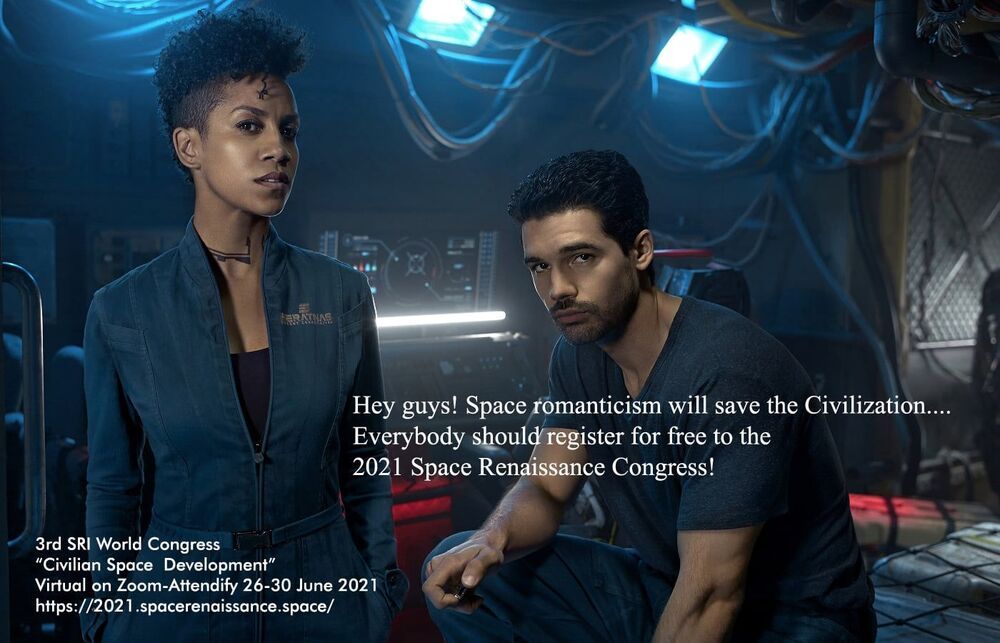Register for free to the 2021 Space Renaissance Congress.
June 26 — 30 virtual on zoom+attendify+youtube.

Register for free to the 2021 Space Renaissance Congress.
June 26 — 30 virtual on zoom+attendify+youtube.
Can We Immunize The World Against Future Pandemics? Dr Jonna Mazet, DVM, MPVM, PhD, UC Davis School of Veterinary Medicine — Global Virome Project.
Dr. Jonna Mazet, DVM, MPVM, PhD, is a Professor of Epidemiology and Disease Ecology at the UC Davis School of Veterinary Medicine, Founding Executive Director of the UC Davis One Health Institute, and Vice Provost For Grand Challenges At UC Davis.
Additionally, Dr. Mazet in on the Steering Committee of the Global Virome Project, Principal Investigator of the PREDICT project, Chair, National Academies’ One Health Action Collaborative, and Co-Vice Chair, UC Global Health Institute Board of Directors.
Dr. Mazet’s work focuses on global health problem solving for emerging infectious diseases and conservation challenges. She is active in international One Health education, service, and research programs, most notably in relation to pathogen emergence; disease transmission among wildlife, domestic animals, and people; and the ecological drivers of novel disease dynamics.
Currently, Dr. Mazet is the Co-Director of the US Agency for International Development’s One Health Workforce – Next Generation, an $85 million educational strengthening project to empower professionals in Central/East Africa and Southeast Asia to address complex and emerging health threats, including antimicrobial resistance and zoonotic diseases.

The Army will begin equipping units with augmented reality headsets by the first quarter of fiscal year 2022, according to Congressional testimony by two of the service’s top officials.
In written testimony prepared for the House Appropriation Committee’s defense subcommittee, Acting Secretary of the Army John Whitley and Army Chief of Staff Gen. James McConville detailed the service’s priorities as lawmakers wait for President Joe Biden’s 2022 budget request. Whitley and McConville wrote that they need continued Congressional support for rapid prototyping, development and procurement for the Integrated Visual Augmentation System, or IVAS, among other emerging programs.
“By 1QFY22, we’ll equip the first unit with IVAS,” Whitley and McConville said in their joint written testimony prepared for a Wednesday hearing. The government’s fiscal 2022 year begins in October.

I still don’t get how there seems to be No organized effort anywhere to achieve the ability to 3D print a perfect genetic match of all organs by 2025 — 2030. You would think some government somewhere would want to work round the clock on this.
NIBIB-funded engineers at the University of Buffalo have fine-tuned the use of stereolithography for 3D printing of organ models that contain live cells. The new technique is capable of printing the models 10–50 times faster than the industry standard-;in minutes instead of hours-; a major step in the quest to create 3D-printed replacement organs.
Conventional 3D printing involves the meticulous addition of material to the 3D model with a small needle that produces fine detail but is extremely slow —taking six or seven hours to print a model of a human part, such as a hand, for instance. The lengthy process causes cellular stress and injury inhibiting the ability to seed the tissues with live, functioning cells.
The method developed by the SUNY Buffalo group, led by Rougang Zhao, PhD, Associate Professor of Biomedical Engineering in the Jacobs School of Medicine & Biomedical Sciences, takes a different approach that minimizes damage to live cells. The rapid, cell friendly technique is a significant step towards creating printed tissues infused with large numbers of living cells.


The UK government on Wednesday became the first country to announce it will regulate the use of self-driving vehicles at slow speeds on motorways, with the first such cars possibly appearing on public roads as soon as this year.
Britain’s transport ministry said it was working on specific wording to update the country’s highway code for the safe use of self-driving vehicle systems, starting with Automated Lane Keeping Systems (ALKS) — which use sensors and software to keep cars within a lane, allowing them to accelerate and brake without driver input.
The government said the use of ALKS would be restricted to motorways, at speeds under 37 miles (60 km) per hour.

**Space Renaissance International (SRI) Medici Fund** is happy to announce that, due to the generosity of our Education Sponsors, we are able to award a few **prizes and grants for students** of any age, interested to space settlement, exploration and civilian development. Three programmes are now open to applicants, in the frame of the **2021 Space Renaissance Congress “The Civilian Space Development”**.
The 3° SRI World Congress (SRIC3) will take place in a virtual format and will provide attendees with cutting-edge developments in Space Settlement & Exploration, Human Rights, Ethics, Policies, Engineering, Entrepreneurship, Energy, Economics and Education from leaders in their respective fields. Experts in research and industry will present the emerging technologies and future directions in their field. Students at all ages, who are interested in Space Science, Technology, Philosophy, Economy, Policy, Law, Art, are warmly encouraged to participate to the 2021 Space Renaissance Congress. Please visit this link to apply to any of the Student Sponsored Programmes: https://2021.spacerenaissance.space/index.php/students-sponsored-programs/
Watch the Webinar “Space Renaissance and Spirituality”, held yesterday April 25th 2021.
The webinar “The Space Renaissance and Spirituality” discusses another, often neglected, primary need of humans: spirituality. Spirituality animated human deep feeelings and culture since the very ancient times of our history on our mother planet, Earth. Spirituality is a feeling that characterizes us, as human beings, and cannot be felt by other sentient but not self-aware and less intelligent species. Spirituality suggests reverence for life and great appreciation for the highest expression of nature: the intelligent life.
The Webinar Series are done in the frame of 2021 Space Renaissance Congress “The Civilian Space Development”.
The panel includes:
- Adriano V. Autino (SRI President and Co-Founder, author of “A greater world is possible!”, trying to develop further the Astronautic Humanism philosophy) 07:41
- Giulio Prisco (blogger and founder of the Turing Church, Hungary) 34:18
- Paul Ziolo (Director of Psychohistory Department, University of Liverpool, UK) 51:37
- Tsvi Bisk (Strategic Futurist, author of Cosmodeism: A Worldview for the Space Age, founder of The Center for Strategic Futurist Thinking, Israel) 01:10:30
- The Cometan (Brandon R. Taylorian, founder of the Astronism channel, UK) 01:27:32
- Steven Wolfe (Founder of Beyond Earth Institute, author of “The Obligation ”, evolutionist philosopher, USA) 01:47:26
- Alberto Cavallo (SRI Co-Founder, Buddhist, Engineer, Scholar of Philosophy, Italy) 02:01:05
Moderates: Giulio Prisco.
Some introductory questions to the panelists:
- Spirituality, and religion, animated human efforts during the whole human history.
- Religions were often used as a sectarian flag, to motivate wars, conquers and ethnic cleansing anti-human acampaigns.
- However, at the dawn of expansion into outer space, humans feel the need to cultivate spirituality — both as individuals and communities — facing the magnificent mistery of the Universe.
- In the same time, a mature open spirituality could be a wonderful synergystic alliedm with science and philosophy, helping to motivate the profund evolutionary impulse to expand Earthly bioma into the Solar System and beyond.
- The original meaning of the term Religion, from Latin language, is religere=joining efforts, and can be related to both theist and secular communities.
- Should space advocacies include spirituality in their public outreach and discussion?
- If yes, how to avoid this message to be confused with irrational, new ageist and fake metaphysics, so common in the web age?
- Which are the common shared deep humanist concepts and ideals, among some currents, such as Astronautic Humanism, Astronism, Cosmodeism, and some theist and non theist Religions?
- The aim of this discussion shouldn’t be a game among different spiritual currents, but a first effort to share and put together some agreed concepts and believes, for the sake of the space renaissance, a true and urgent well motivated strategy of space settlement.

By betting on Starship, which entails a host of development risks, NASA is taking a chance on what would be a much brighter future. One in which not a handful of astronauts go to the Moon or Mars, but dozens and then hundreds. In this sense, Starship represents a radical departure for NASA and human exploration.
“If Starship meets the goals Elon Musk has set for it, Starship getting this contract is like the US government supporting the railroads in the old west here on Earth,” said Rick Tumlinson, a proponent of human settlement of the Solar System. “It is transformational to degrees no one today can understand.”
We will nonetheless try to understand some of the ways in which Starship could prove transformational.
A new phishing campaign targets specific targets by trying to distribute various remote access Trojan (RAT) variants. According to Cisco Talos Intelligence researchers, this hacking campaign was identified as “Fajan” and could be being operated from an Arabic-speaking country.
Experts believe this campaign would have started in early March, starting with a commitment to “low-profile” targets to determine whether malware samples were properly distributed or some debugging process was needed.
Attacks begin in the form of emails specifically addressed to Bloomberg Industry Group customers. This company adds news content on platforms for various industries, such as law, taxes and accounting, and government, and sells them to its various customers.